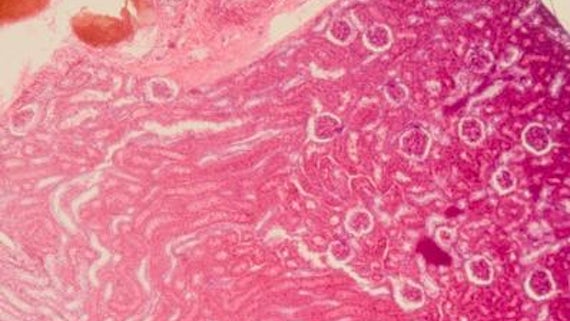New hope for halting cell death caused by disease
17 Tachwedd 2014

Scientists have discovered mechanisms that control a new form of premature cell death in living tissue - called ferroptosis - and a mechanism to reverse it.
Tests have since revealed that this mechanism prevents tissue damage in human kidney cells, acute kidney failure and in liver damage, opening up the possibility for new pharmacological treatments to a number of diseases.
Up until now, ferroptosis was a form of cell death identified only in cancer cells. The findings, published today in Nature Cell Biology, show that this kind of cell death can also be triggered in healthy cells by removing the protein Gpx4, responsible for regulating the cell death process.
To counter this, researchers from Cardiff and Helmholtz Zentrum Munchen (HMGU) collaborated with researchers in Sweden and the USA to understand how to control the process.
Through the use of lipidomics and extensive molecular screening, the team uncovered a small inhibitor called Liproxstatin-1, which proved capable of suppressing ferroptosis. Scientists were then able to use this inhibitor to prevent cell death in living organisms. The findings suggest that this could be a therapeutic target for preventing tissue damage in a range of conditions.
"Ferroptosis may play a role in a number of diseases," said study co-author Professor Valerie O'Donnell from the School of Medicine. "In addition to ischemic tissue damage, seen for example in kidney failure, stroke or cardiovascular disease, the Liproxstatin-1 inhibited pathway holds potential as a therapeutic target for diabetes and neurodegenerative diseases.
"So far its efficacy has been proven in mouse models and human cells, but we are hoping that these exciting results will stimulate further enquiry in this area, helping to unravel mechanisms involved in this important new form of cell death. The aim would now be to try this approach in human trials."
Lead-author Dr Jose Pedro Friedmann Angeli, a Humboldt fellow from HMGU, said: "Our data shows that we can use pharmacological approaches to stop this form of regulated cell death. As a consequence, ferroptosis inhibitors open up novel therapeutic opportunities to mitigate diseases previously thought to be untreatable."
The Cardiff University aspect of the research was funded by The Wellcome Trust.